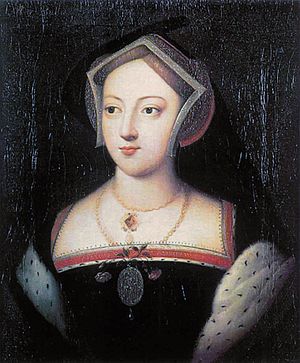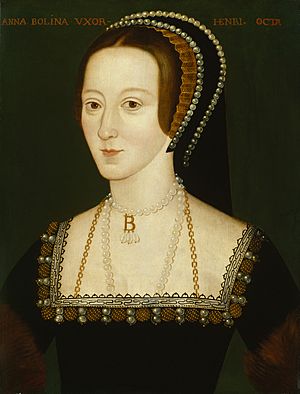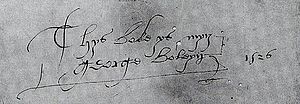Elizabeth Boleyn, Countess of Wiltshire facts for kids
Quick facts for kids
The Countess of Wiltshire
|
|
|---|---|
|
|
| Born | Elizabeth Howard c. 1480 |
| Died | 3 April 1538 (aged 57–58) |
| Buried | St. Mary's Church, Lambeth 51°29′42″N 0°07′13″W / 51.4950°N 0.1202°W |
| Noble family |
|
| Spouse(s) | Thomas Boleyn, 1st Earl of Wiltshire |
| Issue more... |
|
| Father | Thomas Howard, 2nd Duke of Norfolk |
| Mother | Elizabeth Tilney |
Elizabeth Boleyn, Countess of Wiltshire (born Elizabeth Howard; around 1480 – 3 April 1538) was an English noblewoman. She is best known as the mother of Anne Boleyn, who became Queen of England. This also made Elizabeth the grandmother of Elizabeth I of England.
Elizabeth was the oldest daughter of Thomas Howard, 2nd Duke of Norfolk and his first wife Elizabeth Tilney. She married Thomas Boleyn in the late 1400s. Elizabeth became Viscountess Rochford in 1525. Later, she became Countess of Ormond in 1527 and Countess of Wiltshire in 1529.
Contents
Elizabeth's Family and Early Life
Elizabeth Howard was born around 1480. Her family, the Howard family, was very rich and powerful. Her father was Sir Thomas Howard, who later became the 2nd Duke of Norfolk. Her grandfather, Sir John Howard, was made a Duke by King Richard III in 1483.
Her family stayed powerful even after King Richard III died in 1485. He was killed at the Battle of Bosworth and replaced by King Henry VII. Elizabeth was about five years old at that time. As a young girl, Elizabeth became part of the royal court.
Marriage and Life at Court
While at the royal court, Elizabeth married Thomas Boleyn. He was a young man who wanted to achieve great things. They likely married in 1498, before the year 1500. Thomas said that Elizabeth was pregnant many times. However, only three of their children lived to be adults:
- Mary Boleyn (born around 1499 – died 19 July 1543)
- George Boleyn, Viscount Rochford (born around 1504 – died 17 May 1536)
- Anne Boleyn, who became Queen of England (born around 1501-1507 – died 19 May 1536)
During these years, Elizabeth worked as a lady-in-waiting at the royal court. She served Elizabeth of York first, and then Catherine of Aragon. Some old stories suggest that Elizabeth Boleyn was a very beautiful woman. There were rumors that King Henry VIII had been close to Elizabeth before he became interested in her daughter Anne. Some even wondered if Anne Boleyn might be Henry VIII's daughter. However, Henry denied this, and most historians believe these rumors were not true. They might have started because people confused Elizabeth with another woman named Elizabeth Blount, who was close to Henry. Or, the rumors grew as the Boleyn family became less popular.
Elizabeth's Daughters: Mary and Anne
In 1519, Elizabeth's daughters, Anne and Mary, were living in the French royal court. They served the French Queen, Claude.
Historians say that both Thomas and Elizabeth Boleyn "developed feelings of dislike" for their daughter Mary. Later, Mary's choices in love made this relationship even harder. Around 1520, the Boleyns arranged for Mary to marry William Carey. He was a respected man at court. After their wedding, Mary became close to Henry VIII. We don't know exactly when their relationship started or ended. It has been rumored that one or both of Mary Boleyn's children were fathered by Henry, not William Carey. However, few of Henry's relationships were publicly honored, except for Elizabeth Blount. Henry's relationship with Mary was so private that some people later wondered if it had even happened.
Elizabeth's other daughter, Anne, is thought to have had a close bond with her mother. Elizabeth was in charge of her children's early schooling, including Anne's. She taught Anne to play music, sing, dance, and do embroidery. She also taught her poetry, good manners, math, reading, writing, and some French. In 1525, Henry VIII fell in love with Anne. Elizabeth then became Anne's protector and guide. Elizabeth traveled with Anne to see York Place after the powerful Cardinal Thomas Wolsey lost his power. This event showed Anne her first real taste of political influence. Anne was crowned queen four years later.
Elizabeth stayed in Anne's household while Anne was queen. It is believed that Anne's daughter, Elizabeth I, was named after her grandmother, Elizabeth Boleyn. However, she might also have been named after Henry's mother, Elizabeth of York, or both.
Elizabeth Boleyn supported the rest of her family when her oldest daughter, Mary, was sent away in 1535. Mary had married a commoner, William Stafford, without permission. Mary had hoped her sister Anne would help her, as Anne had been her only close friend in the family. But Anne was very angry about Mary's actions and refused to see her.
The Family's Downfall
Only a year later, in 1536, the Boleyn family faced a much bigger problem. Anne and her brother George were accused of serious crimes. Historians Eric Ives and Retha Warnicke both believe these accusations were made up. They also agree that the King wanted to marry Jane Seymour. The exact reasons for Anne's downfall are still debated by historians. However, academic historians agree that Anne was innocent and loyal to her husband. Even so, the judges followed the King's wishes. They sentenced Anne, George Boleyn, and four other men to death. Elizabeth's husband Thomas Boleyn and her brother Thomas Howard, 3rd Duke of Norfolk did not help those who were accused. The men were beheaded on 17 May 1536. Anne was executed by a French swordsman two days later.
Later Life and Death
After the terrible events of 1536, Elizabeth retired to the countryside. She died just two years after her two younger children. Her husband, Thomas, died the following year. Elizabeth is buried in the Howard family chapel at St Mary's Church in Lambeth. This church is now the Garden Museum.
 | Anna J. Cooper |
 | Mary McLeod Bethune |
 | Lillie Mae Bradford |




